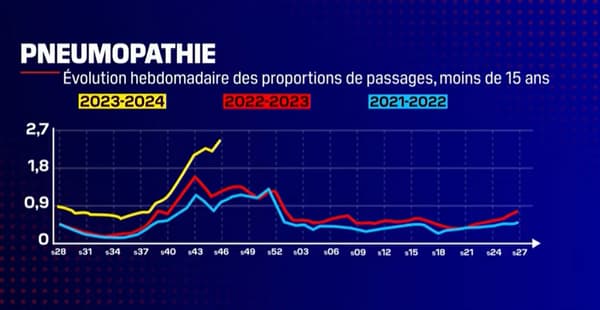Doctors on alert. According to SOS Médicos, lung infections increase at the end of November, especially among children. If the situation is classic as winter approaches, an alert has been issued about a particular bacteria, called Mycoplasma pneumoniae, which mainly affects children between 6 and 15 years old.
+36% pneumonia in children under 15 years of age
According to Public Health France, consultations for pneumonia to SOS Medicos increased by 36% among those under 15 years of age during the week of November 13 to 19, according to a bulletin published on Thursday.
The figure follows the trend observed in other infections, also among children under 15 years of age, such as ENT pathologies and flu (+29% and 24% respectively) or bronchitis (+23%) and suspected Covid-19 (+ 44%).
“We are currently in an epidemic period of RSV (respiratory syncytial virus, editor’s note),” pediatrician Andreas Werner, president of the French Association of Ambulatory Pediatrics (AFPA), confirms to BFMTV.com. However, the increase in pneumonia is significantly higher at the end of November than last year and the year before at the same time.

An “alert” issued about a bacteria
The pediatrician tells BFMTV.com that his entire profession has received an “alert” about a particular bacteria, called Mycoplasma pneumoniae.
“There are more cases and they are more serious, with cases in intensive care,” he says.
Specifically, the doctor explains that he receives patients who present symptoms of a classic infection, with high fever and cough, in which classic antibiotics are ineffective. After several days, your doctor should review your prescription.
According to the pediatrician, mycoplasma infection mainly affects children between 6 and 15 years old, so not the youngest ones. “It is much rarer in children under 5 or 6 years old,” says Andreas Werner.
Fever, cough and headache.
“These are so-called acute community pneumonias, that is, they are not contracted in the hospital, but in the city,” virologist Bruno Lina told BFMTV.
The symptoms observed are close to those of classic pneumonia. “Fever, we cough, we sneeze, we have a headache and we can also have, when pneumonia develops, a cough with difficulty breathing,” he lists below.
If this last symptom is observed, it is absolutely necessary to go to the hospital, the doctor emphasizes. As a small peculiarity, this type of infection has a “quite long incubation period, often two weeks,” according to Bruno Lina.
The doctor, however, wants to reassure him. “Not all forms of Mycoplasma pneumoniae are serious forms,” he emphasizes, specifying that “the associated mortality is low.” Additionally, the disease is usually well treated with various antibiotics.
A cyclical increase?
But why such an increase? If pediatrician Andreas Werner does not come forward and assures that the upward trend in infections must still be confirmed in the next 2 or 3 weeks, virologist Bruno Lina estimates that this type of pneumonia evolves over time.
“We know that it is a bacteria that has circulation cycles internationally, approximately every 5 years, however, the winter of 2023-2024 falls within 5 years following the last time Mycoplama pneumoniae caused an epidemic internationally. with an increase in the number of cases,” he explains.
“There is a risk that within 5 to 15 years Mycoplasma pneumoniae will circulate a little more abundantly than usual,” estimates the scientist, considering that the trend will continue in the medium term.
A post-Covid increase?
For the two doctors, the Covid-19 pandemic is probably not unrelated to this return of mycoplasmas. “Inevitably we can see a link there because we acquire an immunological debt” during this period, explains the president of the AFPA. “For almost two years, there were much fewer infections than usual in the entire population, so the level of antibodies fell,” he continues.
“After Covid, we had episodes of more infectious diseases, such as herpangina,” explains the pediatrician, referring to this painful infection, which especially causes blisters.
For now, the doctor says he remains on guard. “It’s something we need to keep an eye on, but we’re not particularly concerned,” she said.
Source: BFM TV

